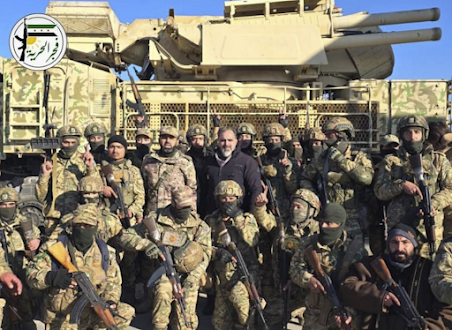 |
| Militants in Syria captured the Russian the Pantsir anti-aircraft missile and cannon complex |
The ongoing conflict in Syria has long been a complex and multifaceted issue, with various regional and international actors involved. Among these actors, Israel has been closely monitoring the situation, particularly the recent rebel offensive in Syria. While Israel considers the rebel offensive to be in its own interests, as it may divert Hezbollah's attention away from Israel and towards Syria, the situation also presents significant concerns and strategic dilemmas for the Israeli government.
Israel's primary interest in the rebel offensive lies in the potential to weaken Hezbollah, a powerful Shia militant group backed by Iran. Hezbollah has been a longstanding adversary of Israel, with a history of military confrontations and cross-border tensions. The rebel offensive in Syria could force Hezbollah to redirect its resources and focus towards defending its interests in Syria, thereby reducing its ability to threaten Israel. This strategic advantage is seen as beneficial for Israel's security, as it could alleviate some of the pressure on its northern border.
However, Israel's strategic calculations are not without significant concerns. One of the primary fears is that the intensified fighting in Syria could lead to the deployment of additional Iranian forces in the country. Iran has been a key ally of the Syrian government and has provided military and financial support to bolster President Bashar al-Assad's regime. The presence of additional Iranian forces in Syria would further entrench Iran's influence in the region, posing a direct threat to Israel's security interests. Iran's expanded military presence in Syria could provide it with a strategic foothold to launch attacks against Israel, increasing the risk of a broader regional conflict.
In addition to the concerns about Iranian involvement, Israel is also wary of the potential strengthening of Russian forces in Syria. Russia has been a crucial player in the Syrian conflict, providing military support to the Assad regime and conducting airstrikes against rebel groups. The presence of Russian forces in Syria has complicated the strategic landscape, as Russia's interests and actions do not always align with those of Israel. The strengthening of Russian forces in Syria could further tilt the balance of power in the region, potentially limiting Israel's ability to act unilaterally in defense of its interests.
The rebel offensive in Syria, while initially seen as advantageous for Israel, has thus presented a complex strategic dilemma. On one hand, the offensive could weaken Hezbollah and divert its attention away from Israel. On the other hand, the intensified fighting could lead to the deployment of additional Iranian and Russian forces in Syria, further complicating the regional security landscape. Israel must carefully navigate this delicate situation, balancing its strategic interests with the need to maintain regional stability and security.
In conclusion, the rebel offensive in Syria presents Israel with a strategic dilemma, as it weighs the potential benefits of weakening Hezbollah against the concerns of increased Iranian and Russian involvement in the country. The situation highlights the complex and multifaceted nature of the Syrian conflict, with various regional and international actors involved. Israel must remain vigilant and engaged in diplomatic efforts to navigate this challenging landscape, ensuring that its strategic interests are protected while promoting regional stability and security. The future of the Syrian conflict and its implications for Israel and the broader region will depend on the ability of all parties to work together towards a peaceful and sustainable resolution.



.png)













.jpg)

No comments:
Post a Comment